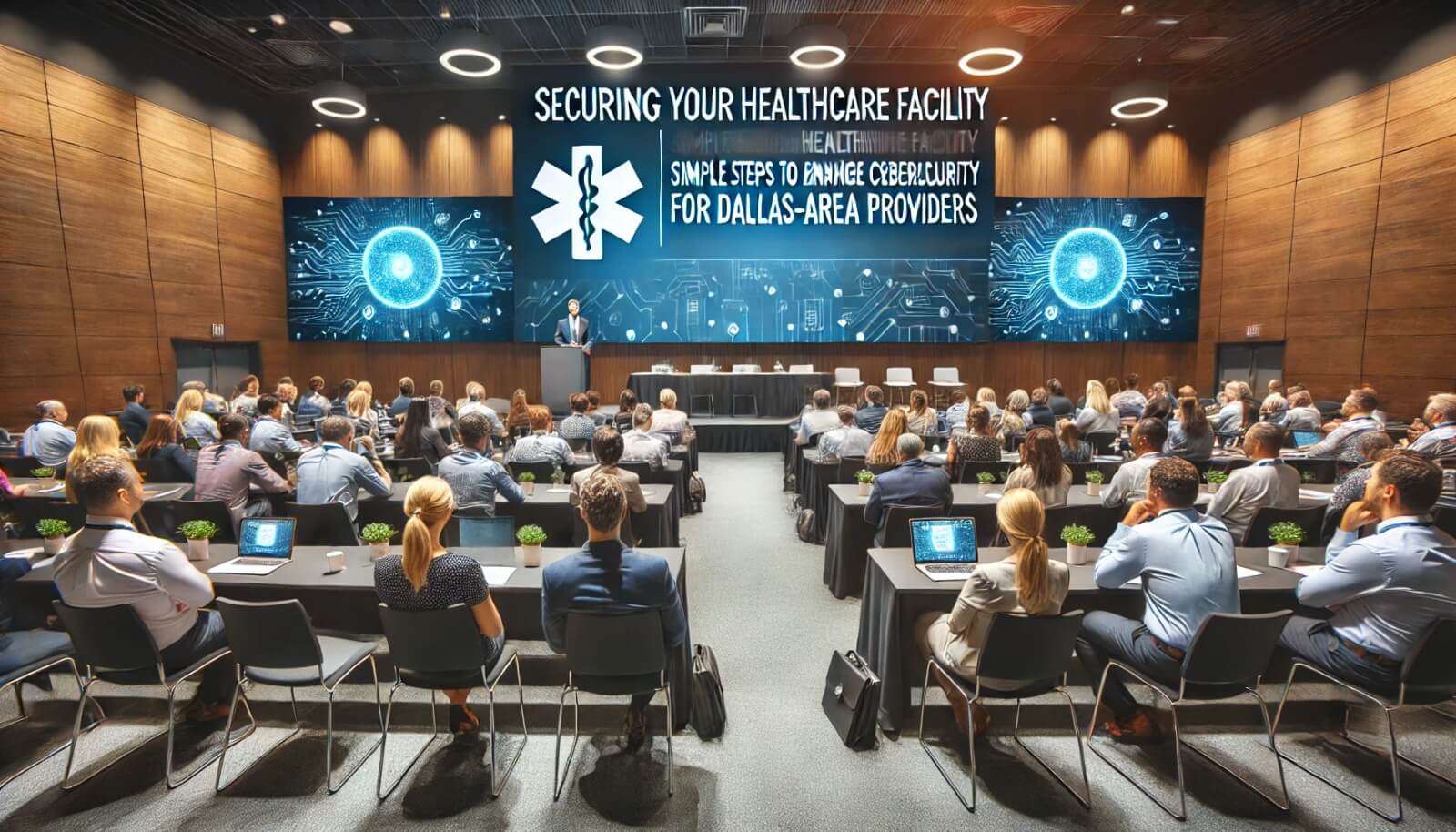
In today’s digital landscape, cybersecurity is crucial for every business, especially in the healthcare sector. Healthcare facilities rely on a significant amount of sensitive patient data and sophisticated technology to maintain daily operations. With such reliance on IT systems, these facilities have become prime targets for cyberattacks.
At ITRemedy, a Dallas – Fort Worth IT Company offering specialized cybersecurity services for healthcare providers, we understand the unique challenges facing healthcare facilities in safeguarding their systems and data. In this article, we’ll explore both basic and advanced cybersecurity practices to help your healthcare facility protect itself against common threats.
Why Cybersecurity is Critical for Healthcare
Cybersecurity for healthcare facilities goes far beyond protecting patient records—it involves safeguarding the entire operation. Hospitals, clinics, and medical centers rely on interconnected systems for patient care, medical device management, and communication. A breach in any of these systems could disrupt patient safety, cause operational delays, and result in financial losses.
In fact, healthcare organizations are now one of the top targets for cybercriminals due to the value of patient data. According to a recent IBM report, the average cost of a healthcare data breach in 2023 was a staggering $10.93 million per incident. This makes robust IT services in Dallas, focused on securing healthcare providers, more essential than ever.
Common Cybersecurity Threats Facing Healthcare Facilities
Understanding the cyber threats that your healthcare facility faces is the first step in protecting against them. Below are the most common cybersecurity threats in healthcare:
1. Phishing Attacks
Phishing is a form of cyberattack where attackers send fraudulent emails to trick employees into sharing sensitive information or clicking malicious links. In healthcare, phishing attempts often target employees by posing as internal communications from hospital management or insurance companies. Phishing attacks can compromise the entire facility’s network if not properly managed. As part of Dallas cybersecurity services, ITRemedy provides phishing detection tools and training to reduce risks.
2. Ransomware
Ransomware attacks are becoming increasingly prevalent in healthcare. Attackers lock a facility’s data or systems and demand payment to restore access. This can halt operations, delay patient care, and cost the facility both time and money. In 2021, the U.S. Department of Health and Human Services cited ransomware as the most frequent attack on healthcare facilities. Cybersecurity near me, like those offered by ITRemedy in Richardson, Plano, and Frisco, can help mitigate these attacks through preventive measures like data encryption and secure backups.
3. Data Breaches
Data breaches involve unauthorized access to sensitive information, including personal patient data and financial records. Breaches can lead to identity theft, fraud, and significant damage to your healthcare facility’s reputation. Using services like IT Services Dallas, healthcare facilities can implement strong encryption and data protection strategies to safeguard patient data.
4. Insider Threats
Not all threats come from external hackers. Insider threats, whether intentional or accidental, can also jeopardize your facility’s cybersecurity. Employees with access to sensitive data may unknowingly cause breaches through negligence or, in some cases, malicious intent. Implementing role-based access controls and monitoring employee activity is crucial in preventing insider threats.
Basic Cybersecurity Practices for Healthcare Facilities
Securing your healthcare facility doesn’t have to be overly complex. Here are some fundamental steps you can take to improve your cybersecurity:
1. Employee Training
Human error remains the weakest link in many cybersecurity defenses. Regular training for healthcare staff is crucial. Employees need to be able to identify phishing attempts, manage password security, and follow proper data handling procedures. As part of IT services Dallas, ITRemedy offers customized cybersecurity training tailored to healthcare environments.
2. Strong Passwords & Multi-Factor Authentication (MFA)
Weak passwords can provide easy entry points for cybercriminals. Healthcare employees should be required to use strong, unique passwords, and facilities should implement Multi-Factor Authentication (MFA) to add an extra layer of security. Dallas IT companies, like ITRemedy, can help you set up MFA for your facility to secure all accounts.
3. Regular Software Updates
Outdated software is a common vulnerability that cybercriminals exploit. Ensure all systems and applications are up to date with the latest patches and updates. ITRemedy in Richardson and Plano offers managed software updates, ensuring your systems are always secure.
4. Data Encryption
Encrypting sensitive data, both at rest and in transit, protects your information in the event of unauthorized access. Even if intercepted, encrypted data is unreadable without the proper decryption key. Dallas Cybersecurity solutions provided by ITRemedy ensure that all data is encrypted according to industry standards.
5. Access Controls
Not every employee should have access to all systems or data. Implementing role-based access control (RBAC) can significantly reduce the risk of unauthorized access or data breaches. ITRemedy can assist in setting up and monitoring access control measures for healthcare organizations across Dallas, Plano, Frisco, and beyond.
Advanced Cybersecurity Practices for Healthcare Facilities
If your facility is looking to further strengthen its defenses, here are some advanced cybersecurity practices to consider:
1. Network Segmentation
Network segmentation involves dividing your network into isolated segments, limiting the spread of malware in case of an attack. By segmenting critical systems—such as patient records and medical devices—you can reduce the potential damage from a security breach. Dallas IT services can help healthcare facilities design and implement segmented network structures for optimal protection.
2. Advanced Threat Detection & Response (TDR)
Investing in advanced threat detection and response systems can give your facility real-time insights into unusual activity. These tools can detect suspicious behavior and respond to threats before they cause serious damage. ITRemedy provides real-time monitoring and threat detection services for healthcare providers looking for cybersecurity near me in Dallas.
3. Data Backup & Disaster Recovery
Ransomware attacks and data breaches can be catastrophic if there’s no recovery plan in place. Ensure you have secure backups and a robust disaster recovery plan to restore operations quickly. ITRemedy offers comprehensive data backup and disaster recovery services to healthcare facilities in Frisco, Plano, and surrounding areas.
4. Vulnerability Assessments
Regular vulnerability assessments help identify weaknesses in your facility’s security systems. This proactive approach can uncover gaps before cybercriminals exploit them. Penetration testing (pen testing) also allows for the simulation of a cyberattack to gauge how well your systems would hold up. ITRemedy offers vulnerability assessments and pen testing for healthcare organizations across Dallas.
5. Third-Party Vendor Management
Many healthcare facilities work with third-party vendors for services like billing and medical devices. However, these partnerships can introduce risks if vendors do not adhere to strict cybersecurity protocols. Ensuring that your vendors meet high security standards is essential. ITRemedy provides vendor management services for healthcare facilities to ensure that all vendors follow proper cybersecurity procedures.
Practical Steps to Implement Cybersecurity Measures
- Develop a Cybersecurity Policy: Establish clear guidelines on how to handle data and secure your network. Regularly review this policy and make sure all employees understand it.
- Monitor Network Activity: Continuous monitoring for suspicious activity is crucial. Early detection can prevent cyberattacks before they cause serious damage.
- Engage a Dallas Cybersecurity Partner: Small healthcare facilities may not have the resources for an in-house IT team. ITRemedy, a leading IT services provider in Dallas, specializes in healthcare cybersecurity and can offer expert solutions tailored to your needs.
Conclusion: Partnering with ITRemedy for Your Cybersecurity Needs
Cybersecurity is an essential part of healthcare operations, and even small steps can lead to significant improvements in your facility’s protection. From training employees to implementing advanced threat detection systems, there are multiple ways to safeguard your facility from phishing, ransomware, and data breaches.
As a trusted Dallas IT company, ITRemedy offers a range of cybersecurity services tailored to healthcare providers. Whether you’re in Dallas, Plano, Richardson, or Frisco, we can help secure your data, protect your operations, and ensure the safety of your patients.
For more information about how ITRemedy can help your healthcare facility strengthen its cybersecurity, contact us today.








